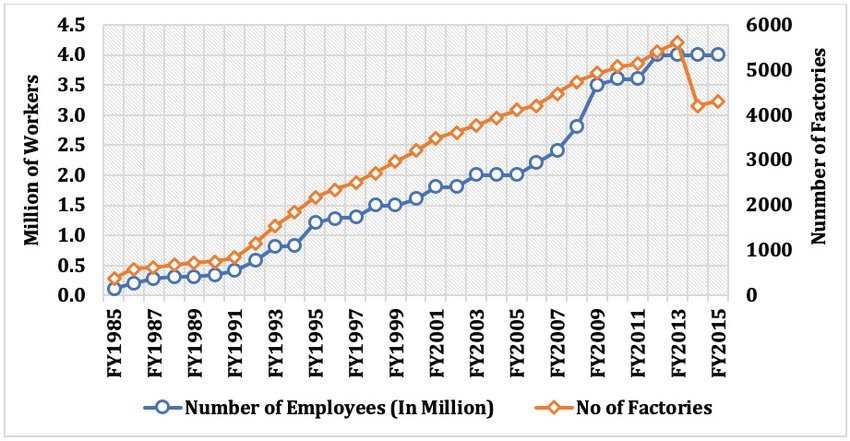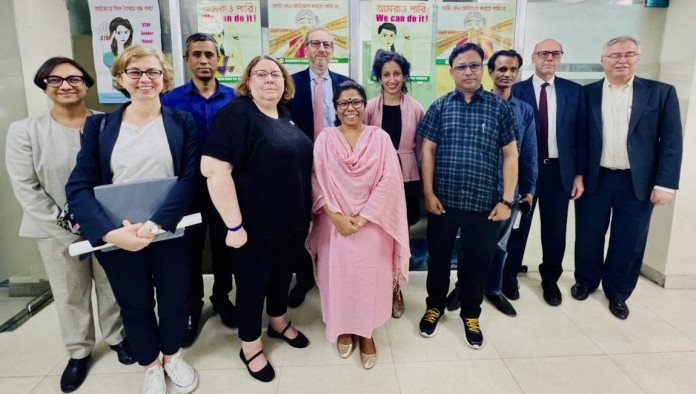Bangladesh ranks as the world’s second-largest exporter of ready-made garments (RMG) following China, employing millions of workers in the industry. In recent years, the Bangladesh government, labor unions, and international partners have taken steps to improve the situation and ensure decent work for all.
You can also read: Dhaka and Washington Pave the Way for a New Chapter
The United States, a major buyer of Bangladeshi garments, has appreciated the efforts of the Bangladeshi labor leaders in pushing for freedom of association, collective bargaining, and living wages for the workers.
Labor Rights in Bangladesh are Improving
Since, Tazreen Fashion fire and Rana Plaza collapse, there have been some positive changes in the sector, thanks to the pressure and support from various stakeholders, such as the government, the employers, the workers, the civil society, and the international community.

Some of the initiatives that have contributed to the improvement of labor rights in Bangladesh are:
- The Bangladesh Accord on Fire and Building Safety, a legally binding agreement between global brands and trade unions, which was signed in 2013 and extended until 2021. The Accord has inspected over 1,600 factories, identified and remediated safety hazards, and trained workers and managers on fire and building safety.
- The Alliance for Bangladesh Worker Safety, a voluntary initiative of 28 North American brands and retailers, which was formed in 2013 and concluded in 2018. The Alliance has inspected over 600 factories, facilitated safety improvements, and provided training and helpline services to workers.
- The Bangladesh Sustainability Compact, a joint initiative of the European Union, the United States, Canada, and Bangladesh, which was launched in 2013 and renewed in 2017. The Compact aims to promote continuous improvements in labor rights, working conditions, and environmental standards in the RMG sector, through dialogue, monitoring, and technical assistance.
- The ILO Bangladesh Program, which has been supporting the government, the employers, and the workers since 2013, to implement the National Tripartite Plan of Action on Fire Safety and Structural Integrity, the Bangladesh Labor Act 2006, and the Bangladesh Labor Rules 2015. The ILO has also provided advisory, capacity building, and awareness raising services to various stakeholders on labor rights issues.
- The Minimum Wage Board, which is a tripartite body comprising representatives of the government, the employers, and the workers is responsible for reviewing and fixing the minimum wages for different sectors. The board has increased the minimum wage for the RMG sector from Tk 8,000 to Tk 12,500 in 2023, after consultations and negotiations with the parties involved.
US History of Supporting Labor Rights
The United States has a long history of supporting labor rights, both domestically and internationally. The US labor movement, which emerged in the late 19th and early 20th centuries, fought for the rights of workers to organize, bargain collectively, and strike for better wages, working conditions, and social justice.
The United States has also been a global leader in promoting labor rights, as part of its foreign policy and development assistance. The US has ratified eight core conventions of the ILO, which cover the fundamental principles and rights at work, such as freedom of association, collective bargaining, non-discrimination, forced labor, child labor, and minimum age.

Government Steps to Improve Labor Rights
The Bangladesh government has taken several steps to improve labor rights, especially in the RMG sector, in response to national and international pressure and expectations.
Some of the steps are:
- The amendment of the Bangladesh Labor Act 2006 and the Bangladesh Labor Rules 2015, to address some of the gaps and weaknesses in the legal framework for labor rights. The amendments, which were enacted in 2018 and 2019 respectively, include provisions to simplify the registration process for trade unions, expand the coverage of the law to export processing zones, increase the penalties for violations, and establish a central fund for workers’ welfare.
- The establishment of the Department of Inspection for Factories and Establishments (DIFE) and the Remediation Coordination Cell (RCC), to enhance the inspection and remediation capacity of the government. The DIFE, which was restructured and strengthened in 2013, is responsible for conducting regular inspections of factories and ensuring compliance with labor laws and standards. The RCC, which was set up in 2017, is responsible for overseeing and facilitating the remediation of safety issues in factories that were inspected by the Accord and the Alliance.
- The formation of the Minimum Wage Board, which is a tripartite body comprising representatives of the government, the employers, and the workers, which is responsible for reviewing and fixing the minimum wages for different sectors. The board has increased the minimum wage for the RMG sector from Tk 8,000 to Tk 12,500 in 2023, after consultations and negotiations with the parties involved. The new minimum wage, which will be effective from January 2024, represents a 56.25% increase from the previous level and is expected to improve the living standards and purchasing power of the workers.
- The adoption of the National Plan of Action on the Elimination of Child Labor 2023-2028, which is a comprehensive and coordinated strategy to eradicate child labor in the country by 2028. The plan, which was launched in 2023, outlines the roles and responsibilities of various ministries, agencies, and stakeholders, and sets specific targets and indicators to monitor the progress and impact of the interventions. The plan also aligns with the Sustainable Development Goals (SDGs), particularly Goal 8, which calls for the promotion of decent work and economic growth for all.
Conclusion
The RMG sector is a vital source of employment, income, and export earnings for Bangladesh, and has contributed to the country’s economic and social development. However, the sector also faces many challenges and risks, such as poor working conditions, low wages, and violations of labor rights.
The Bangladeshi government, labor unions, and international partners have taken steps to improve the situation and ensure decent work for all. The United States, a major buyer of Bangladeshi garments, has appreciated the efforts of the Bangladeshi labor leaders in pushing for freedom of association, collective bargaining, and living wages for the workers.
The US has also supported the improvement of labor standards, the protection of workers’ rights, and the strengthening of labor institutions in Bangladesh, through its foreign policy and development assistance. The improvement of labor rights in Bangladesh is not only a moral and legal obligation, but also a strategic and economic necessity, for the benefit of the workers, the employers, the consumers, and the society at large.


